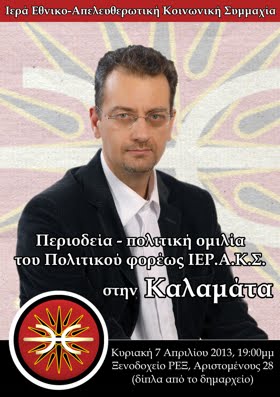The Divine Dogmata reveal to humans the nature and properties of the true Being. They reveal the relations of the Gods with humans. They reveal the Cosmogonic Principles.
Sometimes the Dogma is formulated negatively: it does not say what the Gods are, but what they are not. And this is on account of the difficulty of the issue and the limited human intellect.
The Dogmata of the Hellenic Religion constitute the Authentic and Infallible formulation of the unalterable Divine Truths. The Dogmata of the Hellenic Religion are not subjective, nor are they fluid opinions.
The Dogmata of the Hellenic religion are Eternal Divine Truths. They are not images, sentiments, or impressions of individuals.
The Divine Dogmata do not fall within sensory perception. They lie above human comprehension due to the limited boundaries of the human intellect. The human intellect cannot conceive the infinite divine in its entirety.
Neither logic, nor the senses constitute a criterion for the Truth of the Divine Dogmata. Both continually err, because they are human characteristics. The one and only source of truth is investigative Faith, because it originates from the Gods. And this is because the logical method cannot reach a conclusion unless one supplies it with propositions-premises in order to draw the conclusions that logic wants. And then the matter passes onto whether the propositions-premises are true.
If someone starts with the premise "there are no Gods", or "the Gods are natural forces", then he/she will "logically" reach nonsensical conclusions.
Hellenic Theology utilizes Divine Axioms, and not premises from the mind of every nonsensical person. For the Hellenic Religion, logical is what the Gods say and not what every nonsensical person says.
Comprehension of the Divine Greatness is made only through continuous engagement with the Hellenic Mysteries and with the unwavering Faith in the Omnipotence of the Gods.
In the Hellenic Religion there is no perpetual and unproductive questioning. The only thing the skepticists manage to question is their own existence.
Human logic is an instrument of seeking and not a source of knowledge, or even a supreme criterion of Divine Wisdom.
Gods that have been fabricated by nonsensical Epicureans and Euhemerists, are fabricated to the extent of their own littleness. They attribute their own nonsense and littleness to the Gods.
If someone says he/she knows everything about the Gods, that he/she is able to fathom them (therefore knows everything about them), then that means there is nothing else to learn about the Gods. However, this constitutes utmost blasphemy. However many lives we live, we will never manage to learn more than a little about the Gods.
Those who claim to judge the visible world and the Invisible World with the same weights and measures, lower the level of the Gods to their own human level. They struggle through a chimera, because they try to fumble the Spiritual Level of the Gods.
The Gods, through the Hierophants, abolished the horrible torment of doubt, the questioning regarding divine knowledge. The Gods delivered to humans Their Eternal Dogmata. There can be no forgiveness for the ignorance and questioning of the Eternal Divine Dogmata.
Dogma 1ο : The non-existence of the Gods is impossible to prove
Interpretation: The Gods are independent from humans, from space, from time, and from the World. The Gods do not have a cause of existence outside themselves or for themselves, but absolutely and solely within themselves.
Dogma 2ο : The Gods are Eternal. The Gods were not born, nor will they ever die
Interpretation: The Gods are independent from time; they are not finite. The Gods are everlasting, that is to say, without beginning or end. Worlds are born and pass away; the Gods weren’t born, thus neither do they die. When the Sacred Tradition refers to births of Gods, it refers to their Epiphanies and Incarnations, and not their beginning or end.
Dogma 3ο : The Gods are unalterable
Interpretation: The Gods do not evolve. Whatever is able to evolve, is also able to improve for the better, or to degenerate for the worse. The Gods do not evolve because they are Perfect. Whatever is perfect cannot improve or degenerate.
Dogma 4ο : The Gods are incorruptible
Interpretation: The Gods are not comprised of material elements such as humans and animals, so as to corrupt. Their incorruptibility bears no relation with the incorruptibility of matter, in the sense of continuous regeneration of corruptible material. The Gods do not corrupt; therefore they neither regenerate nor revive.
Dogma 5ο : The Gods are absolutely equal among themselves
Interpretation: The essence of the Gods is one and only in the Universe. There is nothing else which may bear resemblance toward the Gods. The fact that the Gods are absolutely and solely alike unto themselves, means that nothing can be compared with the Gods.
Dogma 6ο : The true Being is uniform
Interpretation: The true Being is the embodiment of all the forms that the Gods take, and each God is one form/aspect of the true Being. There is no question raised about “one or many Gods”. In the Gods a combination exists of multiplicity and unity.
Dogma 7ο : The Gods do not have male or female form
Interpretation: The male and female forms of the Gods exist only so man can more easily perceive the aspects of the Divine. In the Gods there is no male or female in the sense of anthropomorphism, that is to say, with genetic molecules and human characteristics. However, the Gods take human form when they want to reveal themselves to the pious Hellenes.
Dogma 8ο : The Gods are Omnipresent
Interpretation: The Gods are independent from space. The Gods are not restricted by geographical, national, ideological, cultural and tribal borders. Everywhere, at any point of the World a believer may find himself/herself, he/she may call upon Them and They will respond. Those who restrict the power of the Gods to various kinds of borders, blaspheme the Gods themselves.
Dogma 9ο : The Gods are Omniscient
Interpretation: The Gods see, hear and know all. The Gods can hear all the humans of Earth. The Gods can answer to humans concurrently in the language that each person comprehends. The Gods can see and record all the deeds of humans that are done concurrently at a single point in time.
Dogma 10ο : The Gods are Omnipotent
Interpretation: The Gods can do everything. There is nothing above Them, nor something that can hinder them. The Gods can bring time backward or forward.
Even if all the Worlds are lost, just as several Worlds were lost in the history of the Universe, the Gods will continue to exist. Nothing can overcome them, because there is nothing more powerful than the Immortal Gods.
Dogma 11ο : The Gods are the union of Creator and Creation
Interpretation: The Gods do not lie outside, but neither inside, the Universe and the Worlds. The Gods fulfill the Universe and the Worlds. It is impossible for the Gods to lie outside the Universe and the Worlds, because nothing exists outside the Universe. The Universe is without beginning and without end. The Universe should not be viewed as a sphere outside of which something can stand.
Nor do the Gods lie inside the Universe, because they are not smaller than Their Creation. The Creator adjoins without identifying with the Creation.
Dogma 12ο : The Gods are not natural forces
Interpretation: With the term “natural forces”, we mean gravity, electricity, and others. A natural force does not have consciousness or will, something that is contrary to the particular constitution of the Divine Beings. Whoever identifies the Gods with natural forces harms humanity and his/her intelligence. He/she vilifies the Gods.
Dogma 13ο : The Power of the Gods is the absolute survival instinct within man, and not an acquired characteristic
Interpretation: The Gods reside within man. Their power constitutes for man an intrinsic, hereditary survival instinct just like respiration. The Faith in the existence of the Gods does not constitute an acquired characteristic. It is inherent.
Dogma 14ο : The Gods are not archetypes
Interpretation: An archetype is the content of the collective unconscious, according to Carl Jung. Jung speaks of universal-collective images of the psyche that are inherited from generation to generation. But the Gods teach us that they exist regardless of what man believes or whether man exists. Their Power is revealed as an intrinsic instinct within man. But in no case do they constitute a collective thought form, as Jung asserts.
Dogma 15ο : The Gods are not symbols
Interpretation: The Gods exist regardless of whether man honors them. Consequently, whether humans do not make sacrifices to the Gods, whether they do not make them statues, whether they do not make them Temples, the Gods exist. Human symbols constitute means of human expression and comprehension of the Divine Mysteries and are never identified with the Gods.
Dogma 16ο : The Gods are not deified concepts, nor ideas
Interpretation: In ancient Hellas, the Ancestors of the Hellenes honored certain concepts as Sacred. Justice, Wisdom, Zeal, Force, and Victory were considered sacred concepts. However, it is not permitted to confuse the properties, characteristics and powers of the Gods with the Gods. Otherwise we reach the ridiculous conclusion that we deified Wisdom and named it Goddess Athena. This constitutes utmost hubris.
The Ancestors of the Hellenes had the tendency to elevate the Sacred concepts toward the Gods, but never to relegate the Gods toward the Sacred concepts. They honored Wisdom with homages that were sometimes specific to Gods. But they never downgraded the Gods to the level of the Sacred concept "Wisdom".
Justice is a property of the Gods, it is not a god. The homages of humans toward Justice, at the level of a god, do not convert the concept of Justice to a goddess. Themis is a Goddess and has as her main characteristic Justice. This proves that the Sacred concepts are not gods.
Dogma 17ο : The Gods are not deified humans
Interpretation: The blasphemy of the Euhemerists, that the Gods are allegedly deified humans, never held a place in the Hellenic Religion. It constitutes the position of the atheists and the enemies of humanity. Incarnated Gods have existed and will exist, but never deified humans. If some fraudsters deify themselves or deify other fraudsters, for this the Gods are not at fault.
Such actions do not downgrade the Gods to the level of man; on the contrary, they downgrade the deified human to the level of fraudster. Fraudsters do not constitute a source of knowledge concerning things of Gods and the World.
Dogma 18ο : The Essence of the Gods is unknown to humans
Interpretation: The substance-matter from which the Gods are composed of, is impossible to be known by humans. And whoever says that he/she knows the essence of the Gods is a liar and a blasphemer. The essence of the Immortal Gods is known only by the Immortal Gods. No one else.
We know as humans that it is not about immaterial Beings in the sense of non-existence or an absolute vacuum. Because nothing can exist or originate from nothing.
Dogma 19ο : The Gods are Beings with consciousness and will
Interpretation: The Gods are not apathetic, nor are they uninvolved in human affairs, as certain blasphemers claim. They have consciousness and will uninfluenced by external causes. However, they turn Their attention toward the faithful who make sacrifices and pay homages to them requesting for Their help.
Dogma 20ο : The Gods are Judges and Punishers of evil, and never generators of evil
Interpretation: The Gods relentlessly punish the evil done by humans in the World. Justice constitutes an exclusive property of theirs. The Gods allow evil to exist so that man can choose between virtue and vice.
Dogma 21ο : Evil exists in the world so the Gods can demonstrate their Greatness
Interpretation: Evil existed, exists, and will exist, especially as a deified entity inferior to the Immortal Gods. This is recognized by the doctrine of the Hellenic Religion despite the nonsense that is disseminated by certain contemporary heretics. Typhoeus, Alastor, Lamia and Mormo constitute manifestations of Evil that continually change form in order to deceive the pious.
It is because of the existence of Evil that that the Gods display Their Greatness and Power. Evil does not exist so as to make humans tremble, but so that they avoid it.
Dogma 22ο : The Destiny and Free Will of man co-exist, without there being a contradiction
Interpretation: In the Hellenic Religion there is no conflict between Destiny and Free Will. If there were only Destiny, then humans would have no free choice in their lives; they would be prey, blind instruments at the hands of the Gods.
If there were no Divine Providence-Destiny-Fate, then humans would be able to do whatever they wanted, without ever being punished for the damage caused to fellow human beings and to Nature.
Not only do Destiny and Free Will not conflict in the Hellenic Religion, but they also complement each other and co-exist harmoniously.
Dogma 23ο : Miracles constitute the Revelation of Divine Omnipotence
Interpretation: The Miracle does not contradict nor does it identify with the natural laws. Miracles are revelations of the Power of the Gods and do not contest Nature, just as Nature does not contest the Gods.
Dogma 24ο : The Epiphany of the Gods is made through Their appearance to humans, wherever and whenever the Gods want to, with whichever form the Gods want
Interpretation: The living and true Gods reveal themselves continuously. Otherwise they are not true or living Gods. The Gods are not speechless or motionless. The Gods do not neglect humans, animals and plants. However, they appear in a form that many times is not comprehended by humans; nor are they made known to humans, because that's how they choose to do things. There are Epiphanies of Gods for which we know everything, and Epiphanies of Gods for which we know nothing or very little.
Dogma 25ο : The Gods are not identical with the World-Nature
Interpretation: The Gods, when they want to, and if they want to, reside inside trees, rivers and mountains. However, this does not mean that the tree, mountain or river is a god. Pantheism is irreconcilable with the Hellenic Religion. Pantheism constitutes the degeneration and leveling of the concept of the Divine Being. Because by leveling everything, saying everything is god, Euhemerism is introduced through the backdoor. Since trees, rivers and mountains are gods, then man is also a god. Something that constitutes utmost blasphemy.
Dogma 26ο : The Gods are invisible, shapeless and infinite
Interpretation: The Gods do not have a specific shape, nor are they visible or able to be confined to something. Humans, having a limited intellect, many times give them human form in their statues. They do this so they can have some symbol of worship during their Sacred Rituals, but in no case should someone imagine that the Gods have a specific form, or that they are visible to human eyes, or that someone can confine them within some space.
The Gods are infinite; they take up all space and contain all space, never the reverse.
Dogma 27ο : The Gods do not have human passions
Interpretation: Whenever an author appears in Hellenic Theology to attribute passions to the Gods, in actuality he is attributing his own passions and weaknesses to the Gods. Nevertheless, the Gods are Perfect, independently of what Homer, Aristophanes or Lucian wrote and under what sense they wrote it.
Love affairs, jealousies and murders have the human seal of the author and never constitute the seal of the Gods. Exception to this are the Mysteries, where for example the divine infant-Dionysus is mauled by the Titans, because there, through allegory and symbolism, the meaning of the Divine Mysteries is revealed.
Humans were, are, and will be imperfect. The Gods were, are, and will be Perfect. The Gods are not harmed by human follies, although humans are punished by the Gods for their blasphemies.
Dogma 28ο : Nature is Sacred, Animate, Conscious and Inviolable, but not a god
Interpretation: Nature, without constituting a god, is the proof and revelation of the Gods. Nature as animate and conscious, proves that there are beings that do not have human form but have higher consciousness than humans.
Therefore, Nature is Sacred and Inviolable, and its abuse by humans constitutes blasphemy against the Gods. The abuse of Nature is punished together with the denial of the Gods as the two greatest crimes that a human can commit.
Dogma 29ο : The Gods do not have a cause of creation and are self-existent
Interpretation: The Gods are the first Principle. They are the cause for the creation of everything. The Gods deny all boundaries and restrictions. The Gods preclude every kind of imperfection unto Themselves.



















